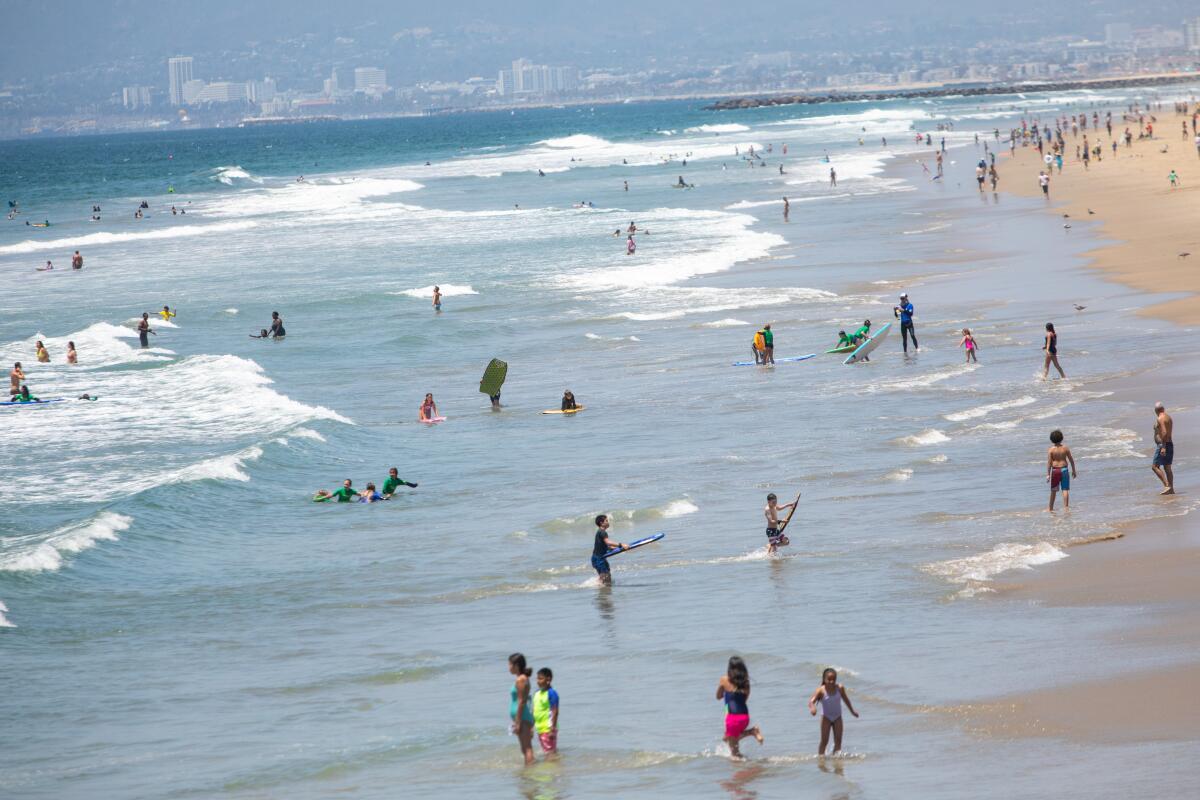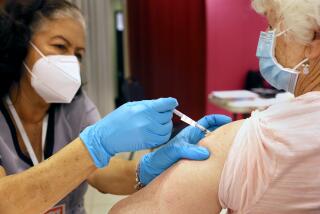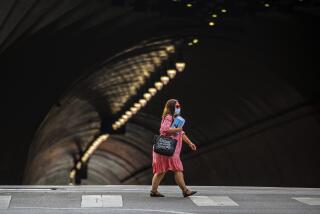California’s July 4 coronavirus warning: ‘Assume everyone around you is infectious’

California is entering a perilous Fourth of July holiday weekend: Coronavirus cases and hospitalizations are continuing to surge even as officials beg the public to avoid crowds and keep physical distancing in hopes of preventing more outbreaks that could overwhelm the state’s hospitals.
Californians who hoped the Independence Day weekend would bring a return to some semblance of summer fun will instead find closed beaches, restaurants limited to outdoor service in most areas of the state and increased enforcement of the state’s order requiring people to wear face coverings in public places.
“Only leave for essential activities like going to work or going to the market,” said Los Angeles Mayor Eric Garcetti. “And you should assume everyone around you is infectious.”
The rate at which coronavirus tests in California are coming back positive continues its alarming climb — jumping 51% over the last two weeks, a Los Angeles Times analysis found.
An increasing rate of positive test results is an indication disease transmission is worsening.
On Thursday, a Times analysis of state data showed that over the last seven days, 6.9% of coronavirus tests came back positive. A week earlier, that number was 5.6%; and a week before that, it was 4.6%. The last time the so-called positivity rate was this high was May 1, when the rate was 7%.
Statewide, hospitalizations continued their upward march; California has broken daily records for the number of people hospitalized with confirmed coronavirus infections for 12 consecutive days, The Times’ analysis found.
There has been a 58% increase in hospitalizations in the last two weeks; on Wednesday, the state reported 5,355 people hospitalized with confirmed coronavirus infections; a week ago, there were 4,321; and two weeks ago, there were 3,398.
There was also a 49% jump in patients in intensive care units with confirmed coronavirus infections in the last two weeks; there were 1,676 reported Wednesday, up from 1,127 two weeks ago.
To help with the surge, the state has announced the reactivation of four alternate care locations — the Imperial Field Medical Site, Seton Medical Center, Fairview Developmental Center and Porterville Developmental Center. Combined, those facilities will make hundreds of additional beds available to relieve stress on the healthcare system.
Gov. Gavin Newsom on Thursday again urged residents to avoid gathering with people who don’t live in the same household.
“We are not out of this crisis; we’re still in the first wave of this crisis. It requires some level of personal responsibility,” Newsom said.
In a sign of the concern over more coronavirus spread, Orange County officials joined Los Angeles and Ventura counties in closing beaches for the holiday weekend. Some Orange County cities initially considered keeping beaches open but changed their position as conditions deteriorated.
Newport Beach decided to put its beaches under hard closure from 10 p.m. Friday until 6 a.m. Sunday after two lifeguards tested positive for COVID-19 and 23 were placed in quarantine.
“I cannot in good conscience add more onto our lifeguards,” Mayor Will O’Neill said at an emergency City Council meeting Wednesday that approved the closure. “We just can’t responsibly ask our lifeguards to do more with less. We just can’t.”
Los Angeles has unveiled a new color-coded system to assess and report the risk of infection.
The online indicator, which Garcetti unveiled Wednesday, is broken into four categories — red, orange, yellow and green — each representing different threat levels.
“Information and data on the threat helps us all inform our behavior, guides us to better days,” Garcetti said.
As of Thursday, L.A.’s indicator was orange, meaning that the risk of infection remains very high, according to Garcetti.
Red, the highest threat level, would mean that “residents must stay at home and take precautions and will likely be on a mandated safer-at-home order,” Garcetti said.
Yellow means “we’re successfully flattening the curve,” and green “will indicate that COVID-19 is mostly contained and presents a very low risk to Angelenos,” he added.
In Silicon Valley, officials in Santa Clara County — one of California’s most cautious counties in restarting its economy — unveiled its reopening plan Thursday.
Santa Clara County never allowed the reopening of bars or indoor dining, and has now concluded that it won’t allow them to reopen for the foreseeable future.
Indoor swimming and saunas are also not allowed to reopen, as well as heated exercise rooms and smoking lounges.
These are “indoor facilities where you’d necessarily have to take off your mask to engage in the activity. Those will not be able to move forward,” said James Williams, county counsel for Santa Clara County.
And because the county’s new planned health order wants to keep people separated from one another and away from crowded areas, other businesses that are unable to do that will also not be able to operate for the foreseeable future. Those include nightclubs, theaters, stadiums, arenas, indoor playgrounds and amusement centers, the county said.
Businesses that will be allowed to resume in the coming weeks include hair salons, nail salons, massage parlors and gyms. Smaller gatherings would also be allowed to resume when the new health order goes into effect, which could be as early as July 13 but could be delayed.
The basic principles of the county’s new health order are that outdoors is safer than indoors; more physical distance is safer; fewer and briefer contacts are safer; and face coverings should be worn consistently and be the new normal, Williams said.
Dr. Sara Cody, Santa Clara County’s health officer, said: “This virus has proven time and again, in communities around the country and around the world, that it will come back with a vengeance if you let your guard down.
“Although we’re testing much more than we have before, these numbers reflect a true increase in the prevalence of COVID-19,” Cody said. “And especially in Southern California, what we’re seeing reflects an exponential growth in transmission that will be extremely difficult to control, and bring back under control.”
Times staff writers Maura Dolan, Hannah Fry and Phil Willon and Times Community News staff writers Hillary Davis and Lilly Nguyen contributed to this report.
More to Read
Sign up for Essential California
The most important California stories and recommendations in your inbox every morning.
You may occasionally receive promotional content from the Los Angeles Times.














